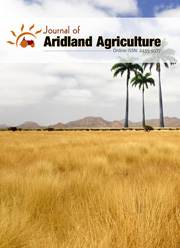The effect of zinc fertilization and cow dung on sterility and quantitative traits of rice
DOI:
https://doi.org/10.25081/jaa.2021.v7.6486Keywords:
Cow dung, Micronutrient (Zn), Yield, Nutrient content and uptake, Aromatic rice.Abstract
The grain yield of rice is far below from its potential yield due low organic matter and micronutrients in the soil. Application of cow dung and zinc fertilizer increases grain yield and quality. A field experiment was, therefore, conducted to evaluate the effect of zinc fertilization and well decomposed cow dung on the spikelet sterility, yield, zinc concentration in grains and plants of aromatic rice (cv. Tulsimala). In this experiment,two levels of well decomposed cowdung (CD) of 0, 10 tha-1, and fourdoses of zinc fertilization viz. 0, 2.16, 4.32, 6.48 kg ha-1 of zinc were used followingeight treatment combinations. The experiment was laid out in a factorial randomized complete block design (RCBD) with replication thrice. The data revealed that zinc fertilization remarkably increased the grain yield of Tulshimala by reducing the spikelet sterility percentages in both conditions of CD and the efficiency of zinc fertilization was superior in manuring (CD) condition to non-manuring condition. However, zinc fertilization at the rate of 4.32 kg ha-1 of zinc produced the maximum grainyields under manuring and non-manuring conditions. Zinc fertilization increased the concentration of Zn in the rice plants and grains without and with CD. The strong linear relationship between the grain yield and zinc concentration in the rice plants and grains was found with in this study. Zinc fertilization increased grain yield and quality by decreasing sterility percentage under CD. Hence, for increasing productivity towards food security in future generation, integrated use organic and inorganic fertilizers should be used.
Downloads
Published
How to Cite
Issue
Section
Copyright (c) 2021 Mohammad Sohidul Islam, Mst. Khaleda Khatun, ASM Golam Hafeez, M. Kaium Chowdhury, Ömer Konuskan, Celaleddin Barutcular, Murat Erman, Fatih Çig, Ayman EL Sabagh

This work is licensed under a Creative Commons Attribution-NonCommercial 3.0 Unported License.





 .
.